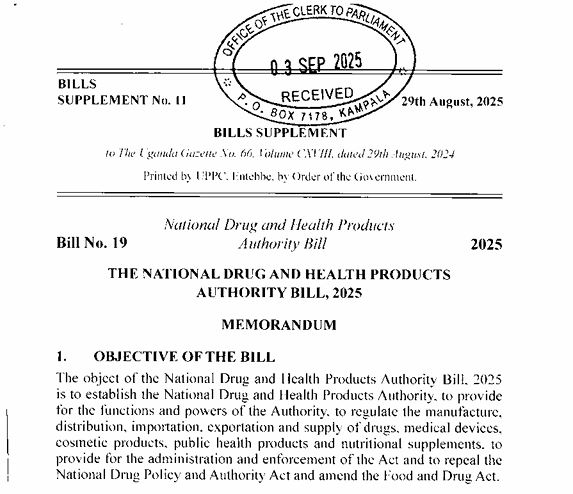Published on 24/09/2025
Pharmaceutical Society of Uganda has opposed stiff penalties proposed in the National Drug and Health Products Authority Bill, 2025, warning that they could cripple both the pharmaceutical and herbal medicine industries.
Appearing before Parliament’s Health Committee, the Society’s Secretary, Stephen Lutoti, argued that the penalties were excessive and unfairly equated individuals with corporate entities.

“The Bill gives the same punishment to corporate bodies and individuals. Yet corporate bodies have deeper pockets,” Lutoti said. “Much as offenders should be punished, you shouldn’t cripple entire organisations or make individuals feel as though they’ve committed capital crimes for regulatory lapses.”

He noted that the proposed fines are far higher than those imposed in neighboring countries and warned they would stifle the growth of local pharmaceutical and herbal businesses.
The Society also criticized Clause 21(4), which allows “any person” to apply for drug registration. Lutoti said this would overload the regulator with substandard applications and proposed that only licensed pharmacists, appointed by manufacturers, should file such applications.
“We recommend replacing ‘any person’ with a pharmacist appointed by the manufacturer. Technical review must come first before submission,” he said.

The Society further objected to requirements that all drugs, including compounded and extemporaneous formulations, be registered before use. Lutoti explained that pharmacists sometimes prepare customized doses, such as lower concentrations not available on the market, for patients. “This bill, as written, would stifle innovation and deny patients lifesaving, tailor-made medicines,” he said.
The Society also urged Parliament to empower the new Authority to issue compulsory licenses in cases of public health emergencies, allowing local production of patented drugs if patent holders refuse to cooperate.
“In circumstances of extreme urgency, the Authority should be able to authorise compulsory licensing so that life-saving medicines remain accessible,” Lutoti said.
The pharmacists also faulted the Bill for failing to specify qualifications for members of the new Authority’s board. While welcoming the reduction of board members from 19 to 9, they insisted that technical expertise must be guaranteed.
“We need members with demonstrable experience in clinical pharmacy, industrial pharmacy, medical devices, supply chain management, and cosmetics law,” Lutoti argued.
They further proposed clear term limits: the executive director should serve only two five-year terms, while board members should be limited to one four-year term, renewable once. This, they said, would ensure transparency and attract fresh talent to the Authority.








